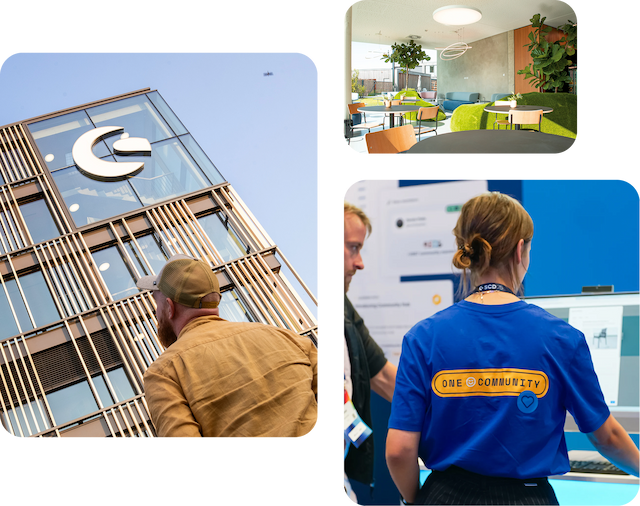![Conscious Commerce: Purpose-driven transformation in a complex world [podcast with experts from Aysnd] Conscious Commerce: Purpose-driven transformation in a complex world [podcast with experts from Aysnd]](https://images.ctfassets.net/nqzs8zsepqpi/7acdKJA3OUWAhXDhtpiYm2/ef7bae35c4a0c47886e10cd83546a5aa/asynd_Blog.png?fm=jpg&w=430&q=80)
In a world where digital transformation is often confused with feature overload and checkbox innovation, the concept of Conscious Commerce is emerging as a powerful countercurrent. More than just a buzzword, it represents a meaningful shift in how companies approach digital experiences – with intention, purpose, and a focus on long-term impact. This philosophy was front and center during a special edition of the Watson Weekly, recorded at Shopware Partner Day in Chicago, featuring Rick Watson in conversation with Carrie Weidenbach and Chris Harrison from Aysnd.
Aysnd, a digital commerce consultancy, is built on a foundational belief: businesses that start with purpose are not only more aligned internally but also more successful externally. As Carrie Weidenbach put it, “Companies that start from that foundation have an easier time prioritizing decisions, getting the team behind the mission, and ultimately driving success.”
Chris Harrison echoed that sentiment, emphasizing that working with purpose-driven brands isn’t just effective – it’s fulfilling. “It’s more enjoyable work when you believe in what you’re doing,” he said.
What is Conscious Commerce?
At its core, Conscious Commerce is about designing commerce solutions with intentionality – focusing on the "why" before the "what." It means aligning strategy with a mission, not just metrics. But don’t mistake this for a soft or sentimental approach. Conscious Commerce is deeply pragmatic. It requires clear prioritization, rigorous measurement, and constant evolution.
Aysnd applies this philosophy through a Conscious Commerce Maturity Model, guiding clients through stages of growth while maintaining a strong grip on fundamentals. "You have to walk before you can run," Carrie notes. “We’re focused on growth all the time, but not too much all at once.”
The challenge of regulated industries
One of the most compelling parts of the interview was Aysnd’s experience with regulated industries, particularly their work with AB InBev, the parent company of Anheuser-Busch. In these industries, commerce is anything but straightforward. Regulatory complexity, multi-tiered distribution systems, and region-specific rules require a level of digital flexibility that traditional platforms often can’t support.
For instance, in the U.S., beer sales must go through distributors – creating a layered ecosystem where pricing, inventory, and customer data must be visible across multiple levels. Aysnd tackled this by building a middleware layer of microservices, abstracting the complexity and normalizing the data before feeding it into a user-friendly commerce platform like Shopware.
The result? A system that empowered customers with analytics and autonomy, enabled distributors to forecast demand accurately, and gave AB InBev the first-party data it desperately needed – especially in the wake of the pandemic, when direct customer relationships became critical.
The value of agility
In today’s market, uncertainty is the only constant. As Chris Harrison pointed out, “People are reluctant to move forward because they’re afraid the world is going to change tomorrow – and they’re right. It might.” That’s why agility isn’t just nice to have; it’s essential.
Shopware, with its composable, API-first architecture, offers Aysnd’s clients a way to stay nimble. It avoids the pitfalls of SaaS lock-in and allows businesses to adapt quickly to regulatory changes, market shifts, or evolving customer expectations.
Prioritization and purpose: The need for needle movers
One of the most relatable moments in the interview came when the team discussed prioritization—or the lack thereof. As Carrie joked, “You can only pick ten number ones,” yet clients often return with 90 “top priorities.”
To cut through the noise, Aysnd emphasizes “needle movers” – features and initiatives that deliver measurable business value. Chris leans on KPIs and metrics, not gut feelings or executive whims. “Call them hippos, giraffes, or elephants,” he said, “but we only have so much capacity, and we need to focus on what actually moves the needle.”
Testing, learning, and living systems
Too often, companies treat digital transformation as a one-and-done project. But as Chris reminded us, “It’s never done.” Conscious commerce is a continuous journey. Testing and experimentation aren’t optional – they’re how you learn what customers actually want and need.
Whether it's A/B testing a feature or evaluating customer sentiment around a UX change, measurement isn’t just about optimization; it’s about validating purpose. As Carrie put it, “If we can’t measure the value, we’re not going to implement the feature.”
Purpose as a strategy
In the end, conscious commerce isn’t about feeling good – it’s about doing good business. It’s strategy rooted in values, execution aligned with impact, and growth guided by intention.
As Aysnd continues to partner with purpose-driven brands and platforms like Shopware, their message is clear: success in digital commerce isn’t about doing more. It’s about doing what matters – on purpose.
Looking ahead
As we move through 2025 and beyond, the companies that thrive will be the ones that embrace change while staying true to their core mission. Purpose and agility aren't tradeoffs – they’re complementary forces. Conscious Commerce helps unite them. Here's to building a more intentional, impactful future – one conscious decision at a time.
Tune in to the recent podcast with Rick Watson Commerce and Aysnd on this topic: Special Episode from Shopware Partner Day – Conscious Commerce & Regulated Realities: The Aysnd Way











